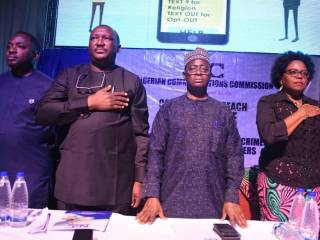The COP is one the three consumer engagement programmes instituted by the NCC and superintended by the Commission's Consumer Affairs Bureau. The other two programmes are Telecoms Consumer Parliament (TCP) which takes place in Lagos or Abuja quarterly and on a rotational basis, and the Consumer Town Hall Meeting (CTM) held monthly at semi-urban or rural centres.
In keeping with the mandate of CAB to protect, inform and educate the telecom consumer, the COP holds monthly at a state capital for those purposes and by that fact stands as a platform for consumers to engage with telecom service providers and seek redress for unsatisfactory services.
Ismail Adedigba, Head Information and Reference at CAB, who represented Felicia Onwuegbuchulam, Director of CAB, at the Calabar event stated that the Bureau's conversation this season is focused on discussing the roles of telecom consumers in mitigating the effects of cybercrimes. Adedigba, his colleague, Banji Ojo, Head Consumer Protection and Advocacy at CAB, as well as other stakeholders, including representatives of telecom companies and consumer advocacy groups discoursed what consumers need to do to prevent being victims of cybercrimes. Speakers advised telecom consumers to protect their personal information, particularly their passwords, and to restrained from sharing Too Much Information (TMI) on social media platforms which can be 'leveraged' by criminals to attack people and their families.
Adedigba informed the participants that NCC already instituted a process to establish industry Internet Code of Practice for Internet service providers in the country, while Ojo recalled series of consumer-centred programmes being implemented by NCC to ease the quality of telecom customers' experience.
These initiatives and programmes include information and education on Phone Etiquette, Child Online Protection, Electromagnetic Field (EMF) discourse, Mobile Number Portability (MNP), Obligations of Service Providers to telecom consumers, the Role of NCC in Consumer Protection, Procedure for Lodging Complaints, Consumer Bill of Rights, Do Not Disturb (2442) Code, and the 622 Toll Free Line provided by NCC which consumers can call to escalate unresolved complaints earlier reported to the service providers.
Concerns about health hazards of telecoms masts were equally discussed by participants at the event. Venny Ezeh, Zonal Controller Port Harcourt zonal office who also supervises Cross River State allayed the fears of participants in that respect. She noted that some of the information bandied about health hazards of telecom masts are yet to be substantiated in scientific research and advised the participants to refrain from panicking.
Participants also got sufficient information, including literatures, on Consumer Complaints Management Procedure, Monitoring of Customer Care Centre Operations of Service Providers, Incidents of SIM Swap and the attendant fraud, Dangers of Sales and buying of Pre-Registered SIM Cards, Call masking and refiling, Protection of telecom infrastructure, as well as base stations and other health concerns of the telecom consumers.
The programme was attended by many stakeholders including Rosemary Archibong, Cross River State Commissioner for Information; State Director of National Orientation Agency, Florence Osang; hundreds of telecom consumers, representatives of telecom service providers, the mass media, advocacy groups and security agencies.
